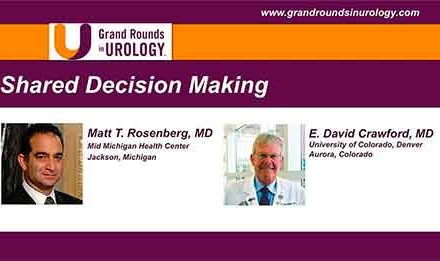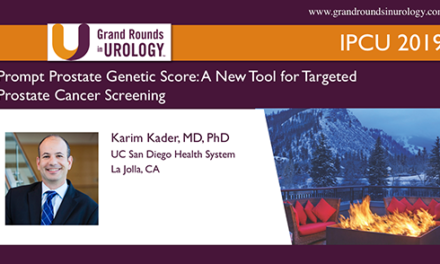
PCa Commentary | Volume 193 – September 2024
Posted by Edward Weber | September 2024
Tumor-Derived Exosomes — a Prostate Cancer Cell-to-Cell Communication System — a Primer
The Basics:
Exosomes are microvesicles extruded from cancer cells (and normal cells) into bodily fluids such as saliva, blood, and urine carrying microRNA, DNA, and proteins. They facilitate cell-to-cell and cell-to-microenvironment communication promoting metastases, immune regulation, and drug resistance. Their size ranges from 30 to 120 nanometers (nano=billionth) compared to red blood cells at 5000 nanometers. Their cargos are transferred to recipient cells to mediate their behavior. Exosomes are stable and tumor-derived exosomes are especially abundant and increase with higher stage aggressive disease. Exosomes are encased in a lipid (fatty) bilayer that protects them from destruction. They are dynamic in that they reflect the changing molecular features of the evolving parent cancer cell from which they arose, and hence can serve as useful biomarkers for diagnosis and disease monitoring. “Tumor-derived exosomes taken up by organ-specific cells prepare the metastatic niche” and invite circulating tumor cells home to the prepared site, such as bone. (Hoshino Et all., Nature. 2015.)
Pirouzpanah et al, (BioFactors. 2024) presented a comprehensive review of the subject: “Harnessing tumor-derived exosomes: A promising approach for the expansion of clinical diagnosis, prognosis and therapeutic outcome of prostate cancer.” Highlighted was the pivotal role of exosome’s cargo of microRNA, messenger RNA, and proteins in regulating cancer development, progression, and metastasis serving as identifying biomarkers for these various states. Research is ongoing to utilize exosomes as drug delivery carriers because of their stability and specificity. Unfortunately, currently, no drugs exist to eliminate tumor-derived exosomes.
Urinary Exosomes for Early Diagnosis of Prostate Cancer:
Urinary exosomal microRNAs excreted after digital prostate massage showed promise as biomarkers for early diagnosis with high accuracy: 81.4% sensitivity and 89.1% specificity. (Yu et al., BMC Urology. 2024) The study compared 92 healthy volunteers to 42 men with biopsy-proven PCa with PSA values >4 ng/mL., a suspicious digital rectal exam, or abnormal imaging. Their exoRNA diagnostic model showed “superior diagnostic efficacy” for indicating the presence of cancer compared to PSA alone which had a sensitivity of 62.8% and specificity of 64.1%. This information could guide the decision as to whether a biopsy is indicated.
Quantifying the Risk of Finding Cancer with Gleason Grade 2 or More on Biopsy:
In recent years several tests have been developed to guide biopsies by estimating the likelihood of having cancer with a Gleason Score greater than 3+3 (i.e., having GG > 2) on the belief that intervention in the lower Gleason Grade1 cancer is rarely indicated and, if found, that active surveillance would be recommended. Those tests include the Prostate Health Index (PHI) – based on blood, the 4-kallikrein Score (4Kscore) – based on blood, MyProstateScore2 (MPS2) – post-DRE urine-based, SelectMDX – post-DRE urine-based and IsoPSA – blood-based. Collectively, the tests have high negative predictive values of 93-100% for ruling out the presence of GG 2 or higher cancers.
The ExoDx Prostate Intelliscore (EPI) is based entirely on urinary exosomes containing messenger RNAs associated with cancer. The test reports the likelihood of GG cancer > 2 on a scale of 0-100. No digital rectal exam (DRE) is required. The intended recipients are biopsy-naive men 50 years or older with PSA values of 2 – 20 ng/mL. Those with a score of 20 or less were 89% (NPV) likely to not have GG 2 or more cancer on subsequent biopsy. (McKiernan et al., Eur Urol. 2018). In a later study by McKiernan of men with prior negative biopsies, PSA 2-10 ng/mL, at a cutoff value of 15.6 the NPV was 92%. Avoiding a DRE allows the urine test to be submitted from home and mailed for analysis. Zhang et al., Analyst. 2024, in the article “Assessment of urine sample collection and processing variables for extracellular vesicle-based proteomics,” cautioned that quality control issues need careful consideration in the handling and mailing of samples. [Search: ExoDx Prostate Intelliscore EPI]
The Role of Exosomes in Predicting Resistance to Therapy, and Inducing Malignant Transformation in Non-malignant Cells:
The androgen receptor mutant AR-v7:
The androgen receptor responds over time to therapeutic pressure by generating a mutant variant that lacks the pocket that receives and responds to anti-androgens such as Zytiga and Xtandi. The cell becomes self-actuating in promoting cancer. This change renders anti-androgens ineffective or less effective in inhibiting AR signaling. Exosomes from an AR-v7 cell can transmit this resistance to other cells with normal AR functioning. Since ARv7-derived exosomes reflect this mutated state, identifying them can signal early resistance to the initial or subsequent use of Xtandi or Zytiga. As stated by Ludwig et al., Oxford University Press, 2021: “This suggests that AR-v7 expression in EVs may be useful in predicting or monitoring resistance to androgen-directed therapies”.
Del Re et al., reported the adverse effects of AR-v7 mutants in “Androgen receptor gain in circulating free DNA and splicing variant 7 in exosomes predict clinical outcome in CRPC patients treated with abiraterone and enzalutamide.” (Prostate Cancer Prostate Dis. 2021). ARv7 and AR gain were analyzed after progression on Lupron and before starting Zytiga or Xtandi. The ARv7 variant was already present in 14.3% of men and AR gain was found in 35%. Progression-free survival was 5.4 months vs 24.3 months in AR-v7+ vs AR-v7- men; for men with AR gain the PFS difference was 4.8 months vs 24.3 months, respectively.
Induction of malignant transformation:
Melo et al., (Cancer Cell. 2014) showed this exosome ability citing that breast cancer–derived exosomes containing microRNAs can reprogram non-cancer cells to become malignant. Their study “identifies a mechanism whereby cancer cells impart an oncogenic field effect by manipulating the surrounding cells via exosomes.”
BOTTOM LINE:
Tumor-derived exosomes are being extensively researched and will be increasingly serviceable in the diagnosis, understanding, and management of prostate cancer.
Your comments and requests for information on a specific topic are welcome e-mail ecweber@nwlink.com.
Please also visit https://prostatecancerfree.org/prostate-cancer-news for a selection of past issues of the PCa Commentary covering a variety of topics.
“We appreciate the unfailing assistance of the librarians at Providence/Swedish.”
ABOUT THE AUTHOR
Edward Weber, MD, is a retired medical oncologist living in Seattle, Washington. He was born and raised in a suburb of Reading, Pennsylvania. After graduating from Princeton University in 1956 with a BA in History, Dr. Weber attended medical school at the University of Pennsylvania. His internship training took place at the University of Vermont in Burlington.
A tour of service as a Naval Flight Surgeon positioned him on Whidbey Island, Washington, and this introduction to the Pacific Northwest ultimately proved irresistible. Following naval service, he received postgraduate training in internal medicine in Philadelphia at the Pennsylvania Hospital and then pursued a fellowship in hematology and oncology at the University of Washington.
His career in medical oncology was at the Tumor Institute of the Swedish Hospital in Seattle where his practice focused largely on the treatment of patients experiencing lung, breast, colon, and genitourinary cancer and malignant lymphoma.
Toward the end of his career, he developed a particular concentration on the treatment of prostate cancer. Since retirement in 2002, he has authored the PCa Commentary, published by the Prostate Cancer Treatment Research Foundation, an analysis of new developments in the prostate cancer field with essays discussing and evaluating treatment management options in this disease. He is a regular speaker at various prostate cancer support groups around Seattle.




